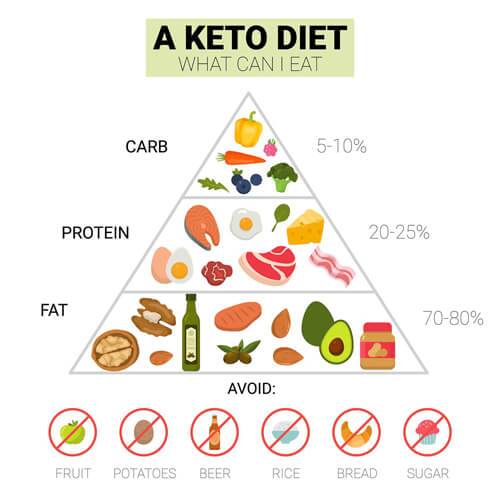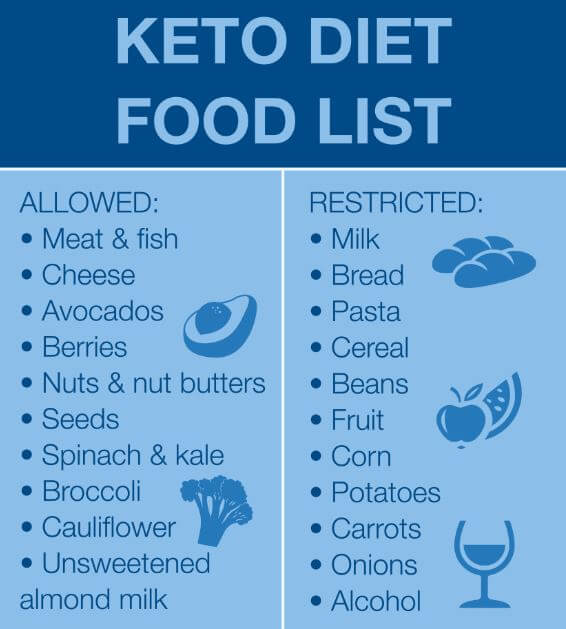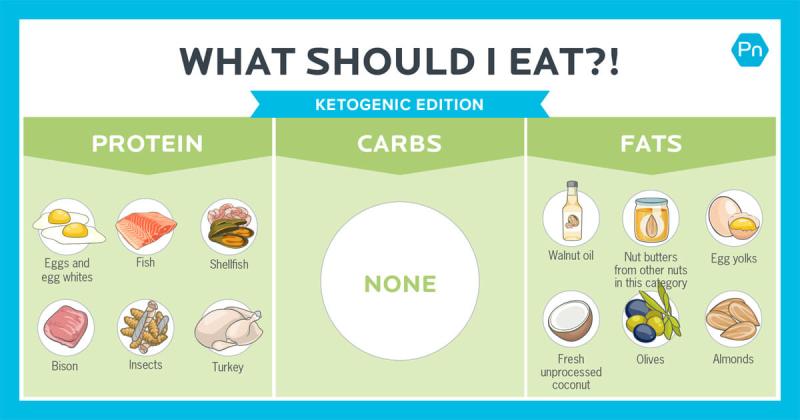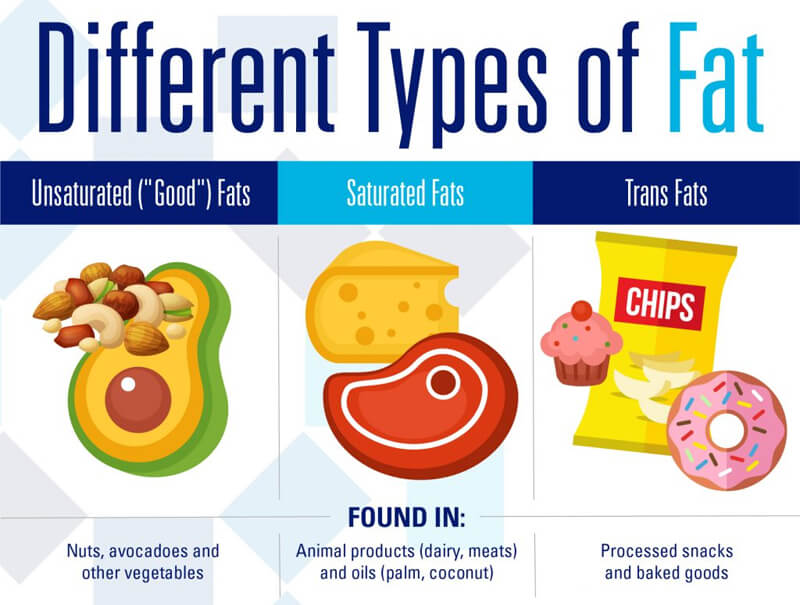 A keto (or ketogenic) diet is a meal plan that focuses on foods that provides healthful fats, adequate amounts of protein, and very few carbohydrates. The goal of the diet is to get more calories from fat than from carbohydrates.
A keto (or ketogenic) diet is a meal plan that focuses on foods that provides healthful fats, adequate amounts of protein, and very few carbohydrates. The goal of the diet is to get more calories from fat than from carbohydrates.
This popular diet works by depleting the body of most of its sugar reserves. After this happens the body will start to break down fat for energy. This results in your liver producing chemicals called ketones. Without carbohydrates and sugars, the body uses ketones for fuel. When your body starts burning fats, it can lead to weight loss.
There are many types of keto diets, including the Cyclical Ketogenic Diet and the Standard Ketogenic Diet. Overall, they are each pretty similar. Reduce carbohydrates to as low as possible, eat a moderate amount of protein, and eat a high amount of fat.
Benefits of a Ketogenic Diet
THE DIET SUPPORTS WEIGHT LOSS
A ketogenic diet can help promote weight loss in numerous ways. The diet has been shown to boot metabolism, which is a huge advantage when trying to lose weight. Many who are on a ketogenic diet report they have a natural reduction of appetite. Your body takes more time to break down proteins and fats. When food is in your digestive tract longer, you'll experience fewer hunger pains.
In numerous randomized controlled trials, researches found that people on ketogenic diets lost more weight than control groups on low-fat diets. While maintaining a calorie deficit will always result in weight loss, maintaining a calorie deficit and following a keto diet results in more rapid weight loss.
THE RISK OF CERTAIN CANCERS IS REDUCED
Researchers examined the effects of a ketogenic diet in helping prevent and treat certain cancers. One study found that a ketogenic based diet may be a safe and suitable treatment to use alongside radiation and chemotherapy therapy in patients with certain cancers. A ketogenic diet has been shown to cause more oxidative stress on cancer cells, which causes them to die.
Another study conducted in 2018 suggests that because the ketogenic diet greatly reduces blood sugar, it can also lower the risk of insulin-related cancers. Insulin is a hormone the body produces that controls blood sugar that has been linked to some cancers.
Studies on the links between cancer and the ketogenic diet are limited. More studies definitely need to be done.
 MAY IMPROVE BRAIN FUNCTION
MAY IMPROVE BRAIN FUNCTIONSome studies, suggest that the ketones which generate during the keto diet provide neuroprotective benefits. This means ketones can strengthen and protect both the brain and nerve cells. As a result, a ketogenic diet may help a person prevent or manage neural conditions such as Alzheimer's disease.
HEART HEALTH IMPROVES
While on the ketogenic diet, it is important to also choose healthy foods. Some evidence shows that by eating healthy fats (such as those found in avocados) instead of less healthy fats (such as those found in pork rinds), cholesterol is reduces and heart health is improved.
An 2017 NIH review of several studies of both animals and humans on a keto diet showed that some people had a significant drop in total cholesterol, low-density lipoprotein (LDL), and triglycerides. They also showed an increase in high-density lipoprotein (HDL), or good cholesterol.
High levels of cholesterol increase the risk of cardiovascular disease. A keto diet's cholesterol-reducing effects may, in turn, reduce a person's risk of cardiovascular disease.
However, the review also concluded that the positive effects of the ketogenic diet on heart health depends greatly on diet quality. Therefore, it's important to eat healthy and nutritionally balanced foods while on the keto diet.
POTENTIALLY REDUCES SEIZURES
The amountof protein, fat, and carbohydrates in a keto diet specifically alters the way the body uses energy, which results in ketosis. Ketosis is a metabolic process during which the body uses ketone bodies (instead of sugars) for energy.
The Epilepsy Foundation suggest that ketosis can reduce seizures in people with epilepsy. This is especially true in those who have not responded to other treatment methods. The study suggests ketosis has the most effect on children who have focal seizures.
A 2019 review by the NIH supports the hypothesis by the Epilepsy Foundation. A keto diet can help people with epilepsy. The ketogenic diet reduces epilepsy symptoms through several different mechanisms.
REDUCES ACNE
Acne has numerous causes and may have links to blood sugar and diet in some people.
Eating a diet that is high in refined and processed carbohydrates may change the balance of gut bacteria. This in turn causes blood sugar to spike and fall significantly. This can adversely affect skin health.
According to a 2012 study, when carbohydrate intake is reduced, acne occurrence is also reduced in some people.

IMPROVEMENT OF PCOS SYMPTOMS
Polycystic ovary syndrome (PCOS) is a hormonal disorder that leads to an excess male hormones, polycystic ovaries, and ovulatory dysfunction. A carbohydrate rich diet causes adverse effects in people with PCOS, such as skin problems and weight gain.
One NIH study from 2005 examined five women over 24 weeks. The researchers found that a ketogenic diet improved several symptoms of PCOS, including:
• Weight loss
• Insulin levels
• Hormone balance
• Ratios of follicle-stimulating hormones (FSH) and luteinizing hormones (LH)
Another review of studies in 2019 found that a ketogenic diet had numerous beneficial effects on people with hormonal disorders, including both PCOS and type 2 diabetes.

RISKS OF A KETOGENIC DIET
The ketogenic diet has tremendous health benefits. But staying on a ketogenic diet can have long-term adverse effects. Some of these risks include:
• Excess protein in the blood
• Kidney stones
• Fat buildup in the liver
• Mineral and vitamin deficiencies
Keto Flu is another common condition in people who start a keto diet. The symptoms of Keto Flu include:
• Constipation
• Fatigue
• Nausea
• Low blood sugar
• Headaches
• Vomiting
• Reduced physical activity
These symptoms are very common at the beginning of a keto diet, but most report that they fade or are completely gone after the body adapts to its new energy source. This can take anywhere from 5-10 days.
Conclusion
 It is very important for you to discuss any intended diet plan with your doctor or trusted healthcare provider, especially if your are trying to manage a health problem or disease. Seek a consultation with a doctor and determine if you have hypoglycemia, diabetes, heart disease, or any other health conditions. Make sure the keto diet is a safe for you.
It is very important for you to discuss any intended diet plan with your doctor or trusted healthcare provider, especially if your are trying to manage a health problem or disease. Seek a consultation with a doctor and determine if you have hypoglycemia, diabetes, heart disease, or any other health conditions. Make sure the keto diet is a safe for you.
Studies on the long-term benefits of a ketogenic diet are sparse. It is not clear if maintaining a keto diet over extended periods is more beneficial than other healthy eating patterns.
A ketogenic diet restricts and severely limits carbohydrates. But some carbohydrates provide healthy benefits. A less restrictive dietary approach may be more helpful for some people. Consuming a diet that has a variety of nutrient-dense, fibrous carbohydrates (fruits and vegetables), along with protein sources and healthy fats is the current medical standard put forth by most of the healthcare community.
More Information
Dr. Eric Berg has posted a great video where he proposes links between insulin resistance and numerous heath disorders. His solution is a healthy keto diet combined with intermittent fasting. His YouTube channel has over 8.9 million subscribers.











